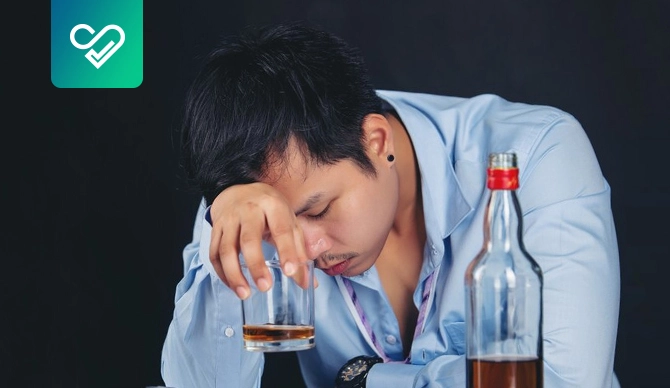Do you ever wonder how alcohol affects your heart? Whether it’s a celebratory toast or a casual drink with friends, the impact of alcohol on our cardiovascular system is often underestimated. But what happens when the heart races after drinking alcohol?
Let’s explore the relationship between alcohol and heart rate; along with answering ‘how to slow heart rate after drinking alcohol?’
Table of contents
How Does Alcohol Affect The Heart?
Alcohol, in moderation, has proven to have some cardiovascular benefits, like increasing HDL (good) cholesterol. However, excessive alcohol intake can have negative effects on the heart, including:
- High Blood Pressure: Excessive alcohol consumption can increase blood pressure, increasing the workload on the heart and contributing to cardiovascular issues.
- Cardiomyopathy: Prolonged heavy drinking can weaken the heart muscle, leading to cardiomyopathy, which is a condition where the heart becomes enlarged, thickened, or rigid.
- Arrhythmias: Alcohol can disrupt the heart’s electrical signals, causing irregular heartbeats or arrhythmias, leading to palpitations, dizziness, or fainting.
- Increased Heart Rate: Alcohol acts as a vasodilator, widening blood vessels and lowering blood pressure. In response, the heart pumps harder and faster to maintain circulation, resulting in a rapid heart rate after drinking. This phenomenon underscores the importance of regular heart health screening to monitor the effects of alcohol consumption on cardiovascular function.
- Electrolyte Imbalance: Alcohol can alter the balance of electrolytes like potassium and magnesium, which are essential for maintaining proper heart rhythm and function. Imbalances in these electrolytes can contribute to heart rhythm disturbances.
Why is The Heart Rate High After Drinking?
The mechanism behind elevated heart rate after drinking is multifaceted.
Firstly, alcohol acts as a vasodilator, widening blood vessels and lowering blood pressure. In response, the heart compensates by pumping harder and faster to maintain adequate circulation.
Moreover, alcohol stimulates the sympathetic nervous system, triggering the release of adrenaline, which further makes the heart rate high after drinking. Additionally, alcohol disrupts the balance of electrolytes like potassium and magnesium, which play crucial roles in regulating heart rhythm.
Does Alcohol Interact With Heart Medications?
Yes, alcohol can interact with various heart medications, potentially amplifying their effects or interfering with their metabolism. For instance, combining alcohol with beta-blockers or calcium channel blockers can further decrease blood pressure and heart rate, leading to dizziness or fainting.
Similarly, mixing alcohol with certain antiarrhythmic drugs may increase the risk of arrhythmias or worsen their side effects. It’s essential to consult your healthcare provider about potential interactions between alcohol and your prescribed medications.
How To Slow Heart Rate After Drinking Alcohol?
If you find your heart pounding after drinking alcohol, there are several strategies to help slow it down – To lower heart rate after drinking alcohol, you can:
- Hydrate: Drink water to counteract alcohol’s dehydrating effects and help regulate heart rate.
- Practice Deep Breathing: Engage in deep breathing or relaxation techniques to calm the sympathetic nervous system and reduce adrenaline levels.
- Avoid Caffeine: Steer clear of caffeinated beverages, as caffeine can further stimulate the heart and worsen tachycardia.
- Physical Activity: Gentle physical activity, such as walking, can promote circulation and aid in alcohol metabolism, helping to normalize heart rate.
- Allow Time for Recovery: Give your body time to process alcohol by avoiding excessive drinking and ensuring adequate rest before engaging in strenuous activities.
Should I Give Up Alcohol If I Have a Heart Condition?
Whether to abstain from alcohol depends on various factors, including the severity of your heart condition, overall health, and lifestyle habits. For individuals with certain heart conditions like arrhythmias or cardiomyopathy, alcohol abstinence may be recommended to prevent exacerbations and complications.
However, moderate alcohol consumption, defined as one drink per day for women and up to two drinks per day for men, may be acceptable for those with healthy hearts. It’s crucial to discuss alcohol consumption with your cardiologist, who can provide personalized recommendations based on your medical history.
When to See a Doctor?
If you experience persistent or severe symptoms like a fast heartbeat after drinking or irregular heartbeats, chest pain, dizziness, or shortness of breath after drinking alcohol, seek medical attention promptly.
These symptoms could indicate underlying heart rhythm disturbances or other cardiac issues that necessitate evaluation and management, including cardiac tests to accurately diagnose and address potential concerns.
Additionally, if you have a preexisting heart condition or are taking heart medications, consult your healthcare provider before making any changes to your alcohol consumption habits.
Frequently Asked Questions
Does alcohol slow heart rate?
No, alcohol typically does not slow heart rate – In fact, the heart races after drinking alcohol.
Does alcohol raise heart rate?
Yes, it’s common to experience heart racing after drinking. It acts as a vasodilator and stimulates the sympathetic nervous system, leading to increased heart rate.
How to prevent heart palpitations when drinking alcohol?
To prevent heart palpitations when drinking alcohol, limit your intake, stay hydrated, avoid mixing alcohol with caffeine, and practice relaxation techniques.
How to lower the heart rate after drinking?
To lower heart rate after drinking, hydrate with water, practice deep breathing or relaxation techniques, avoid caffeine, engage in gentle physical activity, and allow time for recovery.
– Disclaimer –
This blog is for informational & educational purposes only and does not intend to substitute any professional medical advice or consultation. For any health-related concerns, please consult with your physician, or call 911.

